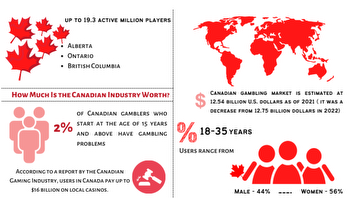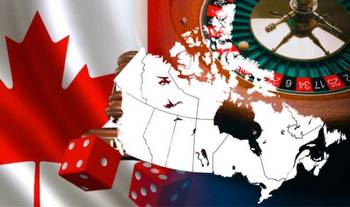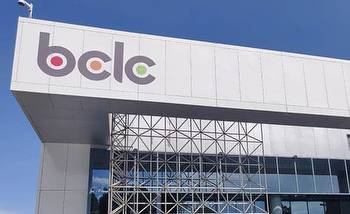Gambling in Canada: Emergence and Development of Online Casinos
Gambling in Canada can be traced back many centuries during which various games were played by indigenous people. According to the records, the French colonists picked up several Indian sports including shinny and lacrosse. Subsequently, there was widespread gambling among settlers with cards, dice, and betting on horse races being most popular. The British influence brought about stricter rules for gambling except for lotteries sanctioned by churches or governments. Statistics show that between 1867 and 1910, provincial governments relied heavily on revenue from lotteries to balance their budgets (Weir).
Overview of Online Casinos in Canada
The modern era of gambling in Canada is credited to private entrepreneurs who were responsible for the development of the first racetrack casinos in the 1930s. This was followed by the opening of the first government-owned charity casinos in the 1950s (Weir). The 1960s and 70s witnessed an expansion of legal gaming with the country’s history-making entry into bingo halls. With more stringent control on gambling activities, provinces opened lottery corporations specializing in sports betting. Gaming continued to develop through this period with the introduction of casino games on riverboats cruising on Canadian rivers first and then at land-based facilities, first on Indian Reserves and then Crown land.
The introduction of online casinos can be attributed to technological advancements that led to the development of new products including “electronic”, “virtual” or “internet casinos”. These are basically online versions of traditional brick-and-mortar establishments where players log onto websites to play casino games. The objective for starting an online casino is a much larger customer base as a result of globalization and the internet. Furthermore, it reduces overhead costs through remote operations and helps in better risk management due to statistical data that is available about customers. Given these benefits, Canadian provinces have been quick to embrace virtual casinos as a means of both increasing revenue and preventing problem gamblers from patronizing traditional bricks-and-mortar establishments (Sussman).
Emergence of Online Casinos in Canada
Casino gambling was first legalized in 1931 by Quebec who introduced legislation permitting “games of chance”. With this approval, races tracks were set up at the Montreal Forum and Royal with parimutuel betting taking place. Subsequent to the enactment of the federal Criminal Code in 1934, all provinces adopted legal provisions similar to those of Quebec. Off-track betting was introduced in New Brunswick by 1955 but it was only after a decade that other provinces followed suit. In 1965, Manitoba opened a charitable casino at a Winnipeg theatre and subsequently began operating a bingo hall for the first time with Alberta following suit in 1968. According to Weir, these were popular forms of gambling during this period as they offered free entertainment, which included dinner and drinks (Weir).
In the early 1970s, Ontario amended its Gaming Control Act permitting charity casinos to be operated by Protestant churches on Indian Reserves where gambling had been taking place for many years informally under tribal custom. The amendment was further expanded to permit government-owned casinos which were established at racetracks in 1984. Today, Indian Reserves are home to casino gaming that generates hundreds of millions of dollars for these First Nations bands under the full control and supervision of the provincial governments (Weir).
Online Gambling Laws in Canada
Canada has made online gambling legal for all provinces except Quebec and Alberta, where it is only allowed under strict conditions (Sussman). Weir explains that provinces such as Ontario and Saskatchewan have moved to control internet gambling either directly through provincial legislation or indirectly by making the supply of online services illegal (Weir).
They did this primarily because they were concerned about problem gamblers. As a result, players are required to sign up for accounts in person and verify with a photo ID before being able to gamble online. Online casino operators are also required to obtain provincial licenses, which requires them to be transparent about their clients’ personal information. However, these legislations have not been effective as one can simply visit another province for online access or play through foreign sites without disclosing client information. To date, Manitoba has yet to introduce legislation making the supply of online gambling illegal.
On the other hand, Atlantic Canada has no legislation restricting internet gambling, which has resulted in new forms of gaming companies targeting these provinces to offer online gaming. For example, in 2010, The Shark Club launched its online casino in New Brunswick and Nova Scotia (Weir).
Casino Gambling Statistics in Canada
Casino gambling in Canada is dominated by slot machine games, which make up 90% of the total gambling revenues. According to 2012 statistics from Revenue Quebec, casinos across the province brought in CAD$1.5 billion in revenue with slot machines accounting for 85% of this amount (quoted in Sussman). These figures confirm that online gambling is not as imperative to the revenue of Canadian casinos as traditional slots (Sussman).
According to Weir, following the legalization of casino gambling in Manitoba and Alberta, annual spending on slot machines increased 13% and 8.9%, respectively. While revenues from other games also increased in these provinces, they were vastly out shadowed by the increased number of slot machines (Weir).
Conclusion
The paper discusses the history of gambling in Canada and how it has evolved into what we see today. Gambling was initially introduced as a means to raise funds for churches and charities through bingo halls and casinos. However, as time progressed and people became more inclined towards betting, the governments stepped in to regulate their control over casinos where slot machines played a dominant role. The introduction of the internet also resulted in new forms of casinos and gaming companies trying to tap into individual preferences for online gambling over traditional ones. Overall, I have provided valuable insight into how gambling in Canada has developed since the past and the role of online casinos within this industry today.





































